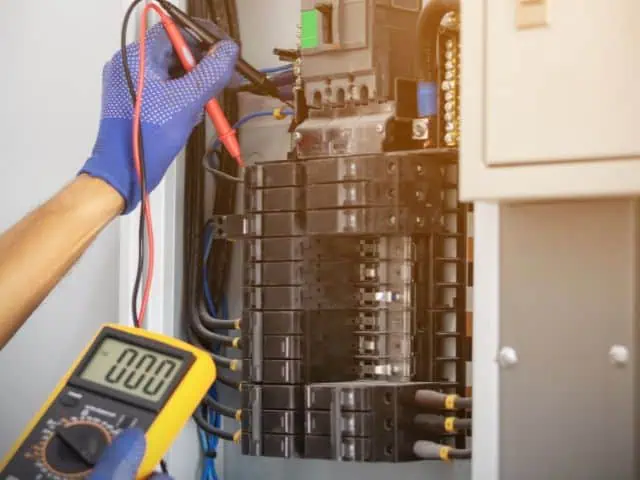Electrical Safety Inspections to Protect Your Home or Business with
At Buckmasters Electric, we are dedicated to ensuring the safety, reliability, and efficiency of your electrical systems—whether in your home or business. Our thorough electrical safety inspection service is designed to identify potential hazards, prevent electrical fires, and ensure compliance with the latest safety standards, giving you peace of mind.
Electrical Safety Inspections - Why Choose Buckmasters Electric?
Certified and Experienced Professionals
Our team of certified electricians has extensive experience in conducting detailed inspections for both residential and commercial properties. We cover every component of your electrical system, ensuring it meets all safety standards and operates efficiently.
Compliance with Safety Standards
We ensure that your electrical system complies with the latest National Electrical Code (NEC) and local regulations. Additionally, we adhere to guidelines from relevant regulatory bodies, including the Texas Department of Licensing and Regulation (TDLR) and Underwriters Laboratories (UL), helping you avoid potential legal issues and safety risks.
Advanced Tools and Techniques
Using state-of-the-art tools such as multimeters, insulation testers, and circuit analyzers, we thoroughly assess your electrical system. Our advanced techniques help detect and address issues before they become costly problems.
Comprehensive Reporting and Recommendations
After our inspection, you’ll receive a detailed report outlining the condition of your electrical system, including any detected risks such as faulty wiring, overloaded circuits, or inadequate grounding. We also provide clear recommendations for any necessary repairs or upgrades to enhance safety and reliability.
Proactive Preventive Measures
Regular inspections can prevent dangerous situations like electrical fires, shocks, and system failures. Our proactive approach helps protect your property and loved ones, ensuring your electrical system remains safe and efficient.
Electrical Safety Inspection Process
Our Inspection Process
Visual Inspection:
- Wiring System: We check for any signs of wear, damage, or outdated wiring that could pose a fire risk.
- Outlets and Switches: All outlets and switches are examined to ensure they are functioning properly and safely.
- Electrical Panels: We inspect the main electrical panel and sub-panels for any issues that could compromise safety.
Testing and Measurement:
- Circuit Breakers: We test circuit breakers to prevent overloads and short circuits, ensuring they are working correctly.
- Grounding System: We verify that the grounding system is properly installed and functioning to prevent electrical shock.
- Electrical Appliances: Our team evaluates the safety and performance of connected electrical appliances.
Compliance Check:
- Safety Standards: We ensure your system adheres to the NEC, local safety regulations, and industry best practices.
- Regulatory Bodies: Compliance with guidelines from TDLR and UL is verified to ensure your property meets all required standards.
Risk Assessment:
- Fire Hazards: Detection of potential fire hazards such as overloaded circuits and faulty wiring.
- Electrical Shock Risks: Assessment of risks related to electrical shock or system failure.
Detailed Reporting:
- Inspection Reports: A comprehensive report detailing the condition of your electrical system and any identified issues.
- System Upgrade Recommendations: Suggestions for upgrades or repairs to enhance the safety, reliability, and efficiency of your electrical system.
Contact Us Today
Don’t wait until a small issue becomes a major hazard. Schedule your Electrical Safety Inspection with Buckmasters Electric today. Protect your property, your family, your employees, and your peace of mind with our professional services.

Electrical Safety Inspection Benefits
Protect Your Property
Prevent electrical fires and other hazards that could cause significant damage.
Ensure Safety
Maintain a safe living or working environment by identifying and mitigating electrical risks.
Enhance System Performance
Improve the reliability and efficiency of your electrical system.
Compliance Verification
Ensure your property meets all current safety standards and regulations.
Peace of Mind
Whether for your home or business, rest easy knowing your electrical system is safe and compliant.
Our experienced and licensed electricians are committed to providing the most thorough and reliable electrical safety inspections for both residential and commercial properties. We stay up-to-date with the latest safety standards and use advanced diagnostic tools to ensure nothing is overlooked.
Secure Your Property's Safety Today
Schedule an Inspection Now!
Testimonial
Frequently Asked Questions
Get Started Today
Illuminate your space with expertly installed recessed lighting by Buckmasters Electric. Contact us today for a consultation and a free quote. Let our professionals bring your vision to life with precision, style, and efficiency.
Buckmasters Electric Service Area
Collin County Electrician Frisco, Texas Electrician McKinney, Texas Electrician Plano, Texas Electrician Wylie, Texas
Dallas County Garland, Texas Mesquite, Texas North Dallas, Texas Sunnyvale, Texas
Van Zandt County Edgewood, Texas Grand Saline, Texas Wills Point, Texas
Kaufman County Electrician Forney, Texas Electrician Kaufman, Texas Electrician Terrell, Texas
Rockwall County Rockwall, Texas Royse City, Texas
Upshur County Big Sandy, Texas Gilmer, Texas
Wood County Quitman Texas